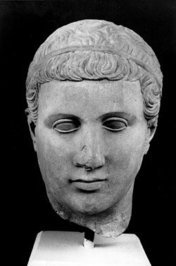Copy Image
A friend of Diagoras pointed out an expensive display of votive gifts and said, 'You think the gods have no care for man? Why, you can see from all these votive pictures here how many people have escaped the fury of storms at sea by praying to the gods who have brought them safe to harbor.'To which Diagoras replied, 'Yes, indeed, but where are the pictures of all those who suffered shipwreck and perished in the waves?
Diagoras of Melos
-
-
Copy Image
![Diagoras of Melos quote. It was about that time [415 BCE] that the poet Diagoras of Melos was proscribed for atheism, he having declared that the non-punishment of a certain act of iniquity proved that there were no gods. It has been surmised, with some reason, that the iniquity in question was the slaughter of the Melians by the Athenians in 416 BCE, and the Athenian resentment in that case was personal and political rather than religious. For some time after 415 the Athenian courts made strenuous efforts to punish every discoverable case of impiety; and parodies of the Eleusinian mysteries were alleged against Alcibiades and others. Diagoras, who was further charged with divulging the Eleusinian and other mysteries, and with making firewood of an image of Herakles, telling the god thus to perform his thirteenth labour by cooking turnips, became thenceforth one of the proverbial atheists of the ancient world, and a reward of a silver talent was offered for killing him, and of two talents for his capture alive; despite which he seems to have escaped](/files/autors/diagoras-of-melos.jpg)
It was about that time [415 BCE] that the poet Diagoras of Melos was proscribed for atheism, he having declared that the non-punishment of a certain act of iniquity proved that there were no gods. It has been surmised, with some reason, that the iniquity in question was the slaughter of the Melians by the Athenians in 416 BCE, and the Athenian resentment in that case was personal and political rather than religious. For some time after 415 the Athenian courts made strenuous efforts to punish every discoverable case of impiety; and parodies of the Eleusinian mysteries were alleged against Alcibiades and others. Diagoras, who was further charged with divulging the Eleusinian and other mysteries, and with making firewood of an image of Herakles, telling the god thus to perform his thirteenth labour by cooking turnips, became thenceforth one of the proverbial atheists of the ancient world, and a reward of a silver talent was offered for killing him, and of two talents for his capture alive; despite which he seems to have escaped
-
Copy Image

With reason did the Athenians adjudge Diagoras guilty of atheism, in that he not only divulged the Orphic doctrine, and published the mysteries of Eleusis and of the Cabiri, and chopped up the wooden statue of Hercules to boil his turnips, but openly declared that there were no gods at all

